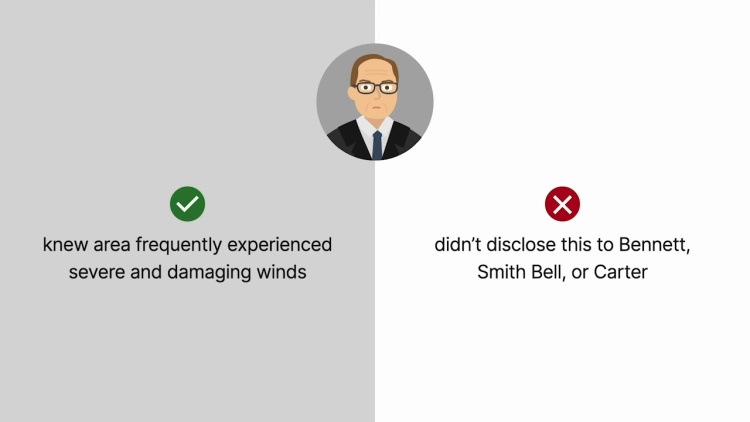Carter v. Gugliuzzi
Vermont Supreme Court
716 A.2d 17 (1998)

- Written by Sean Carroll, JD
Facts
Flavia Gugliuzzi and Ana Barreto (sellers) (defendants) hired Ruth Bennett to list their house for sale. Bennett worked under David Crane for Smith Bell (defendant), a real estate company. Crane had lived in the sellers’ neighborhood and sold several other houses in the area. He knew that the neighborhood frequently experienced severe winds that often caused damage to houses. However, he did not disclose this knowledge to Bennett or Diana Carter (plaintiff), who ended up purchasing the sellers’ house. Under Vermont law, real estate agents had a duty to disclose “all material facts within the licensee’s knowledge concerning the property being sold.” Bennett had told Carter that there had been full disclosure. Several months after Carter bought the house, severe windstorms again hit the neighborhood, destroying trees on Carter’s property, ripping shingles and gutters off of her house, and blowing in windows. Carter brought suit against the sellers and Smith Bell for fraud and negligent misrepresentation under a theory of agency. The trial court found that Crane was an agent of Smith Bell and that his knowledge about the damaging winds was imputed to Smith Bell. The court ruled in favor of Carter. Smith Bell appealed, arguing that Crane obtained the knowledge about the severe winds outside the scope of his employment.
Rule of Law
Issue
Holding and Reasoning (Johnson, J.)
What to do next…
Here's why 907,000 law students have relied on our case briefs:
- Written by law professors and practitioners, not other law students. 47,100 briefs, keyed to 996 casebooks. Top-notch customer support.
- The right amount of information, includes the facts, issues, rule of law, holding and reasoning, and any concurrences and dissents.
- Access in your classes, works on your mobile and tablet. Massive library of related video lessons and high quality multiple-choice questions.
- Easy to use, uniform format for every case brief. Written in plain English, not in legalese. Our briefs summarize and simplify; they don’t just repeat the court’s language.





